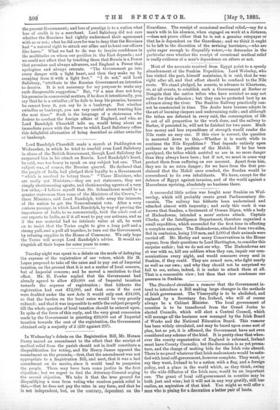Most of the accounts received from Egypt point to a
speedy abandonment of the Suakim Expedition. Lord Wolseley, who has visited the port, himself maintains, it is said, that he was right after all, and that effort should be confined to the Nile route. We stand pledged, he asserts, to advance to Khartoum, or, at all events, to establish such a Government at Berber or Dongola that the native tribes who have assisted us may not suffer for their adhesion ; but they can be protected best by an advance along the river. The Suakim Railway practically cannot be constructed in time. The Arabs have become adepts in the art of burning sleepers and undermining rails ; and although the tribes are defeated in every raid, the consumption of life is out of all proportion to the work done, and the railway to Berber, if persisted in, will not be finished for two years. Much less money and less expenditure of strength would render the Nile route an easy one. If this view is correct, the question is narrowed down to this,—Whether it is worth while to continue the Nile Expedition P That depends entirely upon evidence as to the position of the Mahdi. If he has been paralysed, the tribes which assisted us are in no more danger than they always have been ; but if not, we must in some way protect them from suffering on our account. Apart from him,. they are in no extra danger; for we have from the first proclaimed that the Mahdi once crushed, the Soudan would be surrendered to its own inhabitants. We have, except for the defence of Egypt against invasion, and of the world against a Mussulman uprising, absolutely no business there.


































 Previous page
Previous page